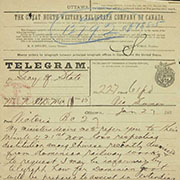CANADA HISTORY - DOCUMENTS INTERNATIONAL
THE ATLANTIC CHARTER
Analysis of the Document - (The Document follows below the Analysis)
The Atlantic Charter, signed in August 1941 by Franklin D. Roosevelt and Winston Churchill, laid the foundation for the post-World War II international order. Although it was primarily a British-American initiative, the principles articulated in the charter had profound implications for Canada’s role in global diplomacy and its emerging identity as a middle power.
The charter’s eight points outlined a vision for a world built on shared principles of peace, self-determination, and economic collaboration. It called for the renunciation of territorial aggrandizement, respect for national self-governance, the restoration of sovereignty to occupied nations, and the reduction of trade barriers. Though Canada was not a signatory, the charter had a direct impact on its foreign policy, as it aligned with the values Canada sought to promote during and after the war—namely, multilateralism, collective security, and the protection of smaller states.
The principles of the Atlantic Charter also reflected Canada’s deepening commitment to international institutions, particularly the United Nations, which would be formed a few years later. As a founding member of the UN, Canada saw the charter’s emphasis on self-determination and peace as a framework for its own diplomatic efforts. Canadian policymakers, such as Prime Minister Mackenzie King, saw the charter as an affirmation of the world order that Canada wanted to help shape—one based on cooperation, rule of law, and collective responsibility.
Domestically, the charter reinforced the growing sense of Canada’s political independence from Britain. While Canada had fought alongside Britain during World War II, the principles of the charter—particularly self-determination and non-intervention—aligned more closely with Canadian interests than with the traditional imperial policies of the British Empire. As a result, the charter became part of Canada’s broader post-war transition to a more autonomous foreign policy.
In terms of its influence on Canadian history, the Atlantic Charter marked a key moment in the evolution of Canada’s role in international affairs. It reinforced Canada’s commitment to liberal democratic values, multilateral cooperation, and peacekeeping, which would define its global identity in the decades following the war. Canada’s subsequent involvement in the formation of NATO, its contributions to the UN peacekeeping efforts, and its advocacy for decolonization in the 1950s and 1960s can all be traced back to the guiding principles of the charter.
In conclusion, while the Atlantic Charter was conceived by the United States and Britain, its impact on Canada was profound. It shaped the country’s foreign policy, bolstered its commitment to multilateralism, and helped Canada navigate its growing independence from British imperial influence. As a document that envisioned a post-war world based on peace and cooperation, the Atlantic Charter became a key reference point for Canada’s emerging role as a diplomatic force and a nation committed to building a just and stable international order.

The President of the United States of America and the Prime Minister, Mr. Churchill, representing His Majesty's Government in the United Kingdom, being met together, deem it right to make known certain common principles in the national policies of their respective countries on which they base their hopes for a better future for the world.
First, their countries seek no aggrandizement, territorial or other;
Second, they desire to see no territorial changes that do not accord with the freely expressed wishes of the peoples concerned;
Third, they respect the right of all peoples to choose the form of government under which they will live; and they wish to see sovereign rights and self government restored to those who have been forcibly deprived of them;
Fourth, they will endeavor, with due respect for their existing obligations, to further the enjoyment by all States, great or small, victor or vanquished, of access, on equal terms, to the trade and to the raw materials of the world which are needed for their economic prosperity;
Fifth, they desire to bring about the fullest collaboration between all nations in the economic field with the object of securing, for all, improved labor standards, economic advancement and social security;
Sixth, after the final destruction of the Nazi tyranny, they hope to see established a peace which will afford to all nations the means of dwelling in safety within their own boundaries, and which will afford assurance that all the men in all the lands may live out their lives in freedom from fear and want;
Seventh, such a peace should enable all men to traverse the high seas and oceans without hindrance;
Eighth, they believe that all of the nations of the world, for realistic as well as spiritual reasons must come to the abandonment of the use of force. Since no future peace can be maintained if land, sea or air armaments continue to be employed by nations which threaten, or may threaten, aggression outside of their frontiers, they believe, pending the establishment of a wider and permanent system of general security, that the disarmament of such nations is essential. They will likewise aid and encourage all other practicable measures which will lighten for peace-loving peoples the crushing burden of armaments.
Franklin D. Roosevelt
Winston S. Churchill
Cite Article : www.canadahistory.com/sections/documents
Source:Samuel Rosenman, ed., Public Papers and Addresses of Franklin D. Roosevelt, vol.10 (1938-1950), 314.



